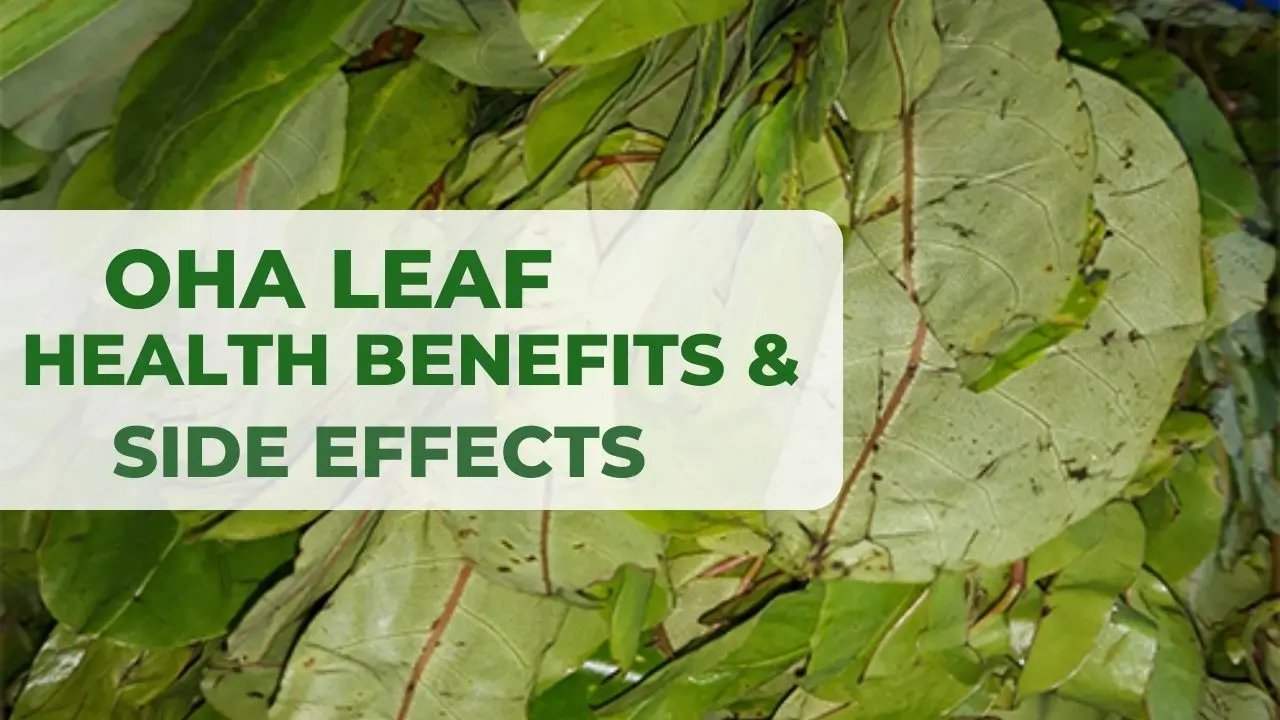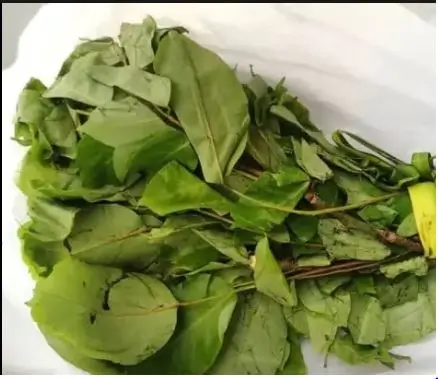
Oha leaf is a popular cooking ingredient in Nigeria’s southeastern region. It is also known as ora leaf, African rosewood, or Pterocarpus mildraedii. The leaf is mostly used for the preparation of soups and other delectable dishes. Aside from the flavour it adds to foods, ora leaf is also used because of its medicinal and health benefits.
Ora leaf is a common vegetable consumed mainly by the Igbos of eastern Nigeria. It is used in preparing soups and other foods requiring vegetables. Many are fond of this vegetable because of its taste when used in soups.
In this article, you will learn about the nutritional facts, health benefits, side effects, and uses of Oha leaf. You will also discover some frequently asked questions about this amazing plant. Without further delay, let’s dive in!
History and Origin of Oha (African Rosewood) Leaf
Oha has a long history and origins in Africa. It is believed that the plant was first cultivated by the ancient Egyptians, who used it for various purposes. The leaf is native to DR Congo, Cameroun, Gabon, and Equatorial Guinea. The tree wood was used for making furniture, coffins, boats, and musical instruments, while the leaves were used for food, dyeing, tanning, and medicine.
The plant was later introduced to other parts of Africa by traders and explorers. It became widely used by different ethnic groups for food and medicine. For example, the Igbos use ora leaf for preparing their traditional soup called oha or ora soup.
Nutritional Facts About Oha (African Rosewood) Leaf
Ora leaf is rich in essential nutrients and vitamins.100 grammes of raw edible leaves contain:
- Energy: 56 Kilocalories
- Moisture content: 85 grammes (g)
- Protein: 4 g
- Fat: 1 g
- Carbohydrate: 8 g
- Crude fibre: 1 g
- Calcium: 72 milligrammes (mg)
- Magnesium: 28 mg
- Iron: 5 mg
- Zinc: 3 mg
The leaves are also rich sources of B vitamins, vitamin C, and antioxidants. They also contain manganese and copper, two important minerals needed for the proper functioning of cells in your body.
Health Benefits of Oha (African Rosewood) Leaf
Ora leaf has many health benefits for the body. Some of them are:
Oha Leaf for Weight Loss
This leaf contains fibre and water, which helps keep your digestive system healthy and prevents constipation. Consuming foods that are high in fibre can help prevent colon cancer and other types of cancer.
Ora leaf can help you lose weight and prevent obesity and diabetes. Fibre reduces appetite and controls blood sugar levels, making it easier to manage your weight.
Oha Leaf for Cholesterol
Ora leaf contains phytosterols, which can compete with cholesterol for absorption in the intestines and reduce its uptake into the bloodstream. This makes it an excellent food choice if you’re looking to lower your cholesterol levels.
This leaf is a great source of antioxidants, which prevent oxidative damage to blood vessels and reduce inflammation. This can improve blood flow and prevent plaque formation.
Oha Leaf for Hypertension
Ora leaf is also good for lowering blood pressure, or hypertension. Hypertension is a condition where the force of blood against the artery walls is too high. This can damage the arteries and organs and increase the risk of heart disease, kidney disease, and stroke.
It contains potassium, which is an essential mineral that helps regulate fluid balance and blood pressure in the body. Potassium helps relax the blood vessels and reduce the tension in them. This lowers the pressure and allows blood to flow more easily.
The leaf also contains magnesium, which is another mineral that helps lower blood pressure. Magnesium helps dilate the blood vessels and improve blood circulation. It also helps regulate nerve and muscle function and prevent spasms.
Oha Leaf for Diabetes
Oha leaf is also helpful for preventing and managing diabetes. Diabetes is a chronic disease where the body cannot produce or use insulin properly. Insulin is a hormone that helps move glucose (sugar) from the blood into the cells for energy. When insulin is not working well, glucose builds up in the blood and causes high blood sugar levels.
The leaf is rich in dietary fibre that can help lower blood sugar levels. Fibre slows down the digestion and absorption of carbohydrates and prevents spikes in blood sugar after meals. Fibre also improves insulin sensitivity and helps the body use glucose more efficiently.
Ora leaf also contains antioxidants that can protect the cells from oxidative stress and inflammation. Oxidative stress and inflammation are factors that can impair insulin function and cause insulin resistance.
Oha Leaf for Fertility
Oha leaf is also beneficial for enhancing fertility in both men and women. Fertility is the ability to conceive or produce offspring. Fertility can be affected by various factors, such as age, lifestyle, hormones, genetics, infections, and environmental toxins.
Ora leaf contains zinc, an essential mineral that plays a key role in reproductive health. Zinc is involved in the production and maturation of sperm cells in men and eggs in women. Zinc also supports hormone balance and immune function, which are important for fertility.
The leaf also contains vitamin C, a powerful antioxidant that can protect the reproductive organs from oxidative damage and infection. Vitamin C also helps improve sperm quality and motility in men and ovulation in women.
Oha Leaf for Skin
Ora leaf contains vitamin A, which is an essential vitamin that helps maintain healthy skin. Vitamin A helps stimulate the growth of new skin cells and repair damaged ones. Vitamin A also helps prevent acne, wrinkles, dryness, pigmentation, and sunburn.
The leaf also contains vitamin C, which is another vitamin that helps improve skin health. Vitamin C helps produce collagen, which is a protein that gives skin its strength and elasticity.
Vitamin C also helps brighten skin tone, fade scars, reduce inflammation, and protect skin from free radicals and UV rays.
Oha Leaf for Hair
Ora leaf contains iron, which is an important mineral that helps transport oxygen to the hair follicles and stimulate hair growth. Iron deficiency can cause anaemia, which can lead to hair loss and thinning.
The Vitamin A in the leaf helps regulate the production of sebum, which is the natural oil that moisturises the scalp and hair. Sebum also prevents infections and inflammation that can damage the hair follicles and cause hair loss.
Oha Leaf for Constipation
The African rosewood leaf is high in dietary fibre, which can help soften the stool and increase its bulk. Fibre also helps stimulate the contraction of the intestinal muscles and move the stool along the colon. Fibre also helps balance the gut flora and prevent infections and inflammation that can cause constipation.
Therefore, eating ora leaf can help you relieve constipation and improve your bowel movement by providing fibre.
Oha Leaf for Stomach Ache
The leaf contains anti-inflammatory and anti-ulcer properties that can help reduce the inflammation and irritation of the stomach lining. Ora leaf also helps protect the stomach from the harmful effects of acid and bacteria that can cause ulcers.
Ora leaf will help soothe stomach aches and prevent ulcers by providing anti-inflammatory and anti-ulcer properties.
Oha Leaf for Diarrhoea
Ora leaf can be used to treat diarrhoea and prevent dehydration. The leaf contains anti-diarrheal properties that can help reduce the frequency and severity of diarrhoea.
The leaf also helps replenish the fluids and electrolytes lost due to diarrhoea, restore the normal function of the digestive system, and prevent further complications.
Side Effects of Oha (African Rosewood) Leaf
Ora leaf is safe to consume for most people. However, some individuals may experience adverse reactions after eating it:
- Gastrointestinal issues: Ora leaf’s high fibre content could cause digestive upsets like nausea, vomiting, diarrhoea, or stomach cramps in sensitive people.
- Allergic reactions: Some people might have allergies to Ora leaf, which can trigger headaches, fatigue, rashes, itching, swelling, breathing issues, or anaphylaxis.
- Medication interactions: Ora leaf may interact with certain medications, like diabetes drugs and blood thinners. This could enhance or reduce their effects.
If you experience any of the above symptoms or other negative symptoms after eating Ora leaf, stop consumption immediately and seek medical help if it is serious.
How to Use Oha (African Rosewood) Leaf
Ora leaf can be used in various ways for food, such as to make ora soup, medicine, and beauty products. Some of the common ways to use an ora leaf are:
Oha Leaf Powder
Oha leaf powder is made by drying and grinding the leaves into a fine powder. Ora leaf powder can be used as a spice or a supplement. You can add ora leaf powder to your soups, stews, sauces, or teas.
Oha Leaf Oil
You can also use ora leaf oil to moisturise, nourish, and protect your skin and hair. The oil can provide you with the same benefits as fresh ora leaf.
Oha Leaf Tea
African rosewood tea is made by boiling fresh or dried ora leaves in hot water for a few minutes. Ora leaf tea can be enjoyed as a refreshing and healthy beverage. You can drink ora leaf tea hot or cold, plain or with honey.
The tea provides the same benefits as fresh ora leaf.
Frequently Asked Questions
Here are some frequently asked questions about African rosewood leaf:
What Is Oha Leaf Called in English?
Oha leaf is called African rosewood in English. It is also known by other names such as ora leaf or Pterocarpus mildraedii.
Can I Use Oha Leaf for Ogbono Soup?
Yes, you can use ora leaf in Ogbono soup. Ogbono soup is a traditional Nigerian soup made with Ogbono seeds (also known as African mango seeds), palm oil, meat, fish, stockfish, crayfish, seasonings, and vegetables.
How Do I Store Oha Leaf?
You can store fresh ora leaves in the refrigerator for up to a week. You should wash and dry the leaves before storing them in a plastic bag or an airtight container. You can also freeze fresh ora leaves for up to 6 months. Put the leaves in hot water for a few seconds, then put them in freezer bags or containers and place them in the freezer.
Can Oha Leaves Be Dried?
Yes, ora leaves can be dried for preservation and use. You can dry the leaves by spreading them on a tray or rack and placing them in a sunny or well-ventilated area. You should turn the leaves occasionally and remove any damaged or discoloured ones. It may take a few days to a few weeks for the leaves to dry completely.
How Do You Preserve Fresh Oha Leaves?
You can preserve fresh ora leaves by freezing them. Wash and dry the leaves, then blanch them in boiling water for a few seconds, drain and cool the leaves, and then pack them in a container and put them in the freezer.
Conclusion
Ora leaf is a wonderful plant that has many health benefits and uses. It is rich in nutrients, vitamins, antioxidants, and phytochemicals that can help prevent and treat various diseases and conditions.
However, the leaf also has some side effects and precautions that you should be aware of. You should consume ora leaf in moderation and consult your doctor before using it if you have any medical conditions or allergies.
This article has given you some useful information about Ora leaf and its benefits and side effects.





